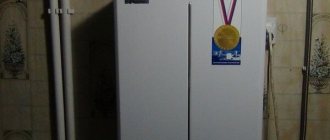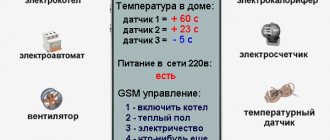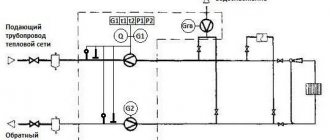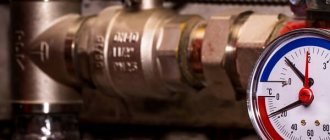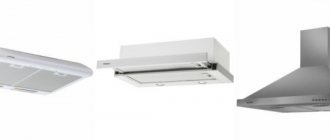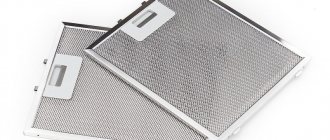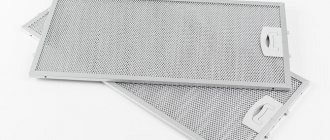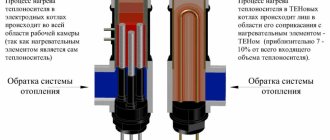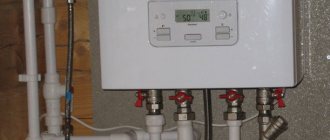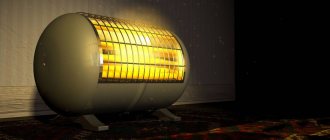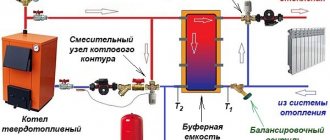How to understand that the water in the heating system does not meet standards
Water from reservoirs, wells and city water pipelines is guaranteed to have high hardness so that it can be used directly in the boiler, only with different indicators. Any of them is dangerous for the boiler and water heating equipment.
You can verify this yourself by performing express tests using test strips to determine water hardness. They can be purchased at hardware stores or pet stores.
Paper indicators are treated with reagents; when they get into water, they acquire a certain color, which is compared with a standard scale.
Water hardness is determined in degrees (°F). According to GOST No. 31865 of 2012, the following hardness indicators are established by which natural water is classified:
- not higher than 2°F - soft;
- not higher than 10°F - average;
- above 10°F - extremely hard.
For use in boilers, water with a hardness of 2-5°F is already dangerous because it promotes scale formation, so it will need to be purified with water softening.
Advantages of using main filters in the home water supply system
The main task performed by filters for water from a well in a country house or country house is the ability to obtain clean water from the tap, without impurities, suitable for use on the farm, as well as for drinking. This is achieved by using devices with varying degrees and types of cleaning - from simple mechanical to ion exchange. An important advantage is the removal of unpleasant odors and improvement of taste through the use of sorbents, for example, activated carbon cartridges.
The use of main filters can solve the problem of scale formation, including on electrical appliances when heated or boiled. This fact significantly increases the service life of kettles, boilers, appliances and pipes of the heating system, etc.
If we consider the disadvantages and some restrictions on the operation of such filters, then it is worth paying attention to the fact that for effective operation they require regular maintenance and replacement of cartridges. Therefore, for heavily contaminated water, it is better to choose another purification option, since in this case the cost of one liter of clean water will be unreasonably high.
Despite the fact that the average price of mainline filters is quite affordable, the cost of the equipment is influenced, first of all, by the initial quality of the water, since the choice of cartridges, type of device and additional equipment is determined by this factor.
Self-cleaning main filters
Often, self-washing main filters are chosen for the water supply system, which do an excellent job of cleaning from mechanical impurities and insoluble compounds, and can be used for cold and hot water, which is a very aggressive environment, especially if it contains chlorine. Mechanical cleaning is handled by special mesh filters made of stainless steel or polymer material, and the size of the cells depends on the type of cleaning:
- for coarse – 100 microns;
- for thin – no more than 5 microns.
The main advantage of this type of device is that they are operated without the use of replaceable cartridges, which is an economically attractive point, and also does not require special and regular maintenance.
An ideal choice for water supply can be the Honeywell FF06-1/2″AA self-cleaning filter, from a German manufacturer. It is a compact, hanging-type device, so it can be installed anywhere in the water supply system. This device is characterized by high reliability and the ability to be used in systems with different pressure levels.
Types of water softening filters
The domestic market is overflowing with offers for water purification filters, both domestic and Western-made. The user needs to understand which softener is best suited for the boiler and autonomous heating system. Next, you will need to select the most appropriate purification method for the initial composition of the water.
Polyphosphate filter
The most affordable and cheapest water softening filter for a boiler, and at the same time a very effective cleaning option. The ion exchange polyphosphate filter module consists of the following basic elements:
- Plastic container in the form of a flask, transparent;
- protective cover for cartridge replacement;
- drainage;
- softening chemical reagent—polyphosphate salt.
Raw or tap water enters the filter container, circulates through a chemical reagent in the form of polyphosphate salt crystals and is impregnated with sodium polyphosphates, forming a phosphate film. It envelops hardness salts, thereby neutralizing their scale-forming properties and protecting boiler heating surfaces from salt deposition.
Polyphosphate is a toxic substance, so after contact with it, water becomes undrinkable. These softeners must be used carefully in hot water supply systems, since due to possible leaks in the structure, water may enter the hot water supply or hot water supply line.
The service life of polyphosphate filters, or rather dissolving polyphosphate salt, is short. The standard consumption of the reagent is 5 grams per 1 ton of water. The reagent is replaced when its volume in the flask is halved. This happens after about six months of filter operation. The cost of polyphosphate ion exchange filters ranges from 500-1400 rubles, and replacing polyphosphates will cost the owner up to 350 rubles.
Magnetic filter
This is the most expensive and effective cleaning method. If you install a compact permanent magnetic filter in front of the boiler, you will not need to constantly regenerate it or change the filter material. It cannot soften water, that is, remove hardness salts from it.
The principle of its operation is different and is based on the transformative effect of a magnetic field on water, as a result of which its structure changes briefly.
Passing through the magnetic filter element, boiler water changes its own physical qualities, while the crystallization process when heating the liquid occurs more intensely, but not on the surface of the heated boiler walls, but in the water column. In connection with this, sludge is formed, which is easily removed by blowing or in a mud pan in front of the boiler.
A characteristic feature of this method of softening boiler water is the temporary nature of magnetization of water, therefore such a filter is installed as close as possible to the boiler unit.
The advantage of this treatment is that when water passes through a magnetic filter, it does not become technical and harmful to humans, therefore it is applicable in double-circuit boilers with hot water heating.
The service life of such softeners is practically unlimited, since the device has no moving or rubbing parts. The cost of installation ranges from 1,500 to 25,000 rubles, depending on the brand, design and hourly productivity of purified water.
Electromagnetic
At a high temperature of hot water in the boiler circuit and a high circulation speed, complete separation of hardness salts from water only with the help of magnetic treatment often does not occur, especially for natural waters with high hardness. To enhance the magnetic effect, electrical treatment of the water is added by placing a specialized electrical treatment on the magnet.
Such a device also functions by treating the source with a magnetic force field, the strength of which is regulated by an effective electrical processor. This pair makes it possible to get a longer lasting effect.
The operation of such a device does not depend on pressure changes and temperature conditions. Transforming hardness salts not only do not harm the boiler, but also act as softening agents for previously deposited scale. Installation cost: from 5,000 to 30,000 rubles.
Which filter to put in front of a gas boiler?
Any heating systems engineer, any owner of a house with a private boiler room asks the question - what kind of heating filter to put in front of the boiler? Which system should I choose if the boiler is gas or double-circuit? Where do you even start when solving such an important problem? First of all, you need to select a company that will develop, compose and commission a water purification system for the proposed boiler house. This expensive option will definitely have to be chosen during the initial water intake. Solving problems with boiler breakdowns and replacing incorrect cleaners will cost more later.
If the water is supplied from central water supplies, or it does not appear to be heavily spoiled by the benefits of civilization, you need to start by checking the composition of the water. The analysis does not cost a lot of money, but it allows you to very accurately compile a list of the necessary water purifiers, and will determine not only the composition, but also the capacity of future treatment facilities. To soften water, sometimes you need at least two devices.
The most commonly used complexes are a combination of mechanical cleaning with softening, iron removal and disinfection. Options for stages can be added or removed depending on the impurities in the water.
Which filter to put in front of a gas boiler? There are no special differences for gas or steam boiler houses. Unless water purification for a steam boiler room should be more thorough. A gas boiler does not require such fine cleaning. Therefore, if the water is simply chalky, then one powerful softener will be enough and, best of all, not just a softener, but a purifier. A magnetic or electromagnetic softener is just right for this case.
Electromagnetic filter AquaShield
To soften water in a boiler room, it is best to use a good electromagnetic filter, which is what AquaShield is. Why is the electromagnetic effect on water so praised, and why is it so much preferable to the same ion exchange? It will perfectly protect boiler equipment from hard water. It works without additional costs and exhausting maintenance, like the same ion exchange filter with all its replacements and restorations. But besides this, AquaShield guarantees practically clean internal surfaces of the equipment, without the involvement of human labor and disassembly of the equipment.
This device works by irradiating water with a magnetic force field. The strength of the latter is supported by a good electrical processor. This pair allows you to achieve a long-lasting effect with little effort. The softener-cleaner is not afraid of pressure and temperature changes. In this case, water softening occurs in such a way that the transformed salts perfectly clean the surfaces of the equipment from old sediment. Yes, this happens slowly, but this process is ongoing.
But you won’t be able to obtain drinking water with the help of one such purifier; you will have to supplement it with something. But in the boiler room, potable quality is not required. For industrial needs, the filter clearly performs all the tasks assigned to it. With such a device, the question of which filter to put in front of the boiler is not worth it.
Mud filter or coarse filter
If water for the boiler room is taken from any type of primary source, then it will definitely not be possible to avoid using a coarse filter in front of the boiler. Any water, even artesian water, contains various types of debris and suspended matter. Even small ones, they can harm the operation of boiler equipment. Damage surfaces, accumulate somewhere, begin to rot, or contribute to the development of rust. That’s why even a banal mud scavenger will be a great help in such a matter.
Everything again depends on the fractional nature of the pollution and the degree of this pollution itself. You may have to install not only coarse filters, but also a sorption device that will help clean the gas boiler from scale, as well as cope with odors and very fine dust. All this also needs to be removed from the water so as not to damage the boiler equipment and subsequently the heating equipment.
Polyphosphate filter
To soften water and protect against scale, a polyphosphate filter is often recommended. It works similar to ion exchange, on the same principle. Only the sodium salt is washed out here more slowly than in ion exchange cartridges, and without replacement, such a device can last almost twelve months. If desired, it can also be used for small boiler rooms, so as not to buy two cleaning devices. But you will have to take care of it, change filters, and check the polyphosphate consumption. That is, there are some conveniences for the consumer.
But such a basis as ion exchange helps to obtain good soft water, including drinking water. But at the same time, the internal surfaces from the old lime deposits will have to be cleaned manually. But then you won’t have to install any filters for drinking water in the kitchen.
The best filters for the boiler
Before making a choice, you need to refer to the factory instructions and familiarize yourself with what the manufacturer offers as water treatment for the boiler. Then, in any SES laboratory or even from a water supply company, you need to take complete results of an analysis of the water that will be used to feed the boiler and heating networks. Before you begin selecting possible modifications, choose from a line of boiler or water heater filters.
In addition, when choosing, experts also advise paying attention to the following parameters:
- Productivity - determines the hourly volume of purified water, m3/hour.
- Dimensions and installation area so that the purifier can be integrated into the existing free space in the boiler room.
- Thread diameter - it must correspond to the diameter of the heating systems.
- Brand - it is safer to purchase a filter from a popular manufacturer and in branded stores. Unfortunately, there are many counterfeits in the retail chain, and in addition, in branded stores you can issue a reliable guarantee and consult on the procedure for using the filter.
Magnetic filter Aquamax XCAL MEGAMAX
Aquamax XCAL MEGAMAX 1/2″ is an Italian highly efficient magnetic anti-scale filter for boilers and boilers. It cleans the heating surfaces of boilers from limestone formations. Designed for heat supply systems with high circulation rates.
The MEGAMAX magnetic softener is made of first-class non-corrosive steel and is considered not dangerous to people. The device does not require changing filter materials. Suitable for boilers with 1/2" piping and can purify water 0.8 m3/hour. Price: 1860 rub.
Phosphate filter Ecosoft SCALEX 200
The filter for the heating boiler Ecosoft SCALEX 200 prevents the formation of scale in heating systems and contains an ecological filter media that does not have polyphosphate, which allows its use not only in heating boilers, but also in hot water supply systems.
The SCALEX 200 filter has the function of chemical water purification and performs mechanical purification of suspended solids and rust products up to 100 microns in size.
Ecosoft SCALEX 200 does not remove hardness salts from make-up water, but has a comprehensive effect on them thanks to the simultaneous use of 3 protection mechanisms:
- Stopping the growth of hardness salt crystals.
- Destruction of the beginnings of foci of scale crystallization.
- Prevents the connection of scale-forming crystals with each other.
The filter can operate without replacing the filter material for 6 months. Cost 1260 rub.
Anion filter SVOD-AS sbb10
A powerful softener can be used not only in domestic heat and power engineering, but also in industrial boiler houses. The device purifies water from hardness salts, heavy metals and any suspended pollutants and impurities.
Water is processed in a special anion exchange cartridge, the reagent of which is processed using a special technology with chemically active components. As a result, Ca and Mg ions in the water are replaced by Na ions, thereby creating easily soluble sodium salts that do not deposit on hot boiler surfaces.
The filter housing is made of plastic that can withstand medium pressure up to 6 atm. One cartridge can process 262 m3 of water and has a shelf life of three years. Price 6700 rub.
Magnetic filter Caleffi XS
The Italian filter is designed for boiler water treatment and combines two types of cleaning: mechanical and magnetic, using a neodymium magnet and a transparent sludge collection chamber to visually control the process. The device can operate in an environment at a pressure of 3 atm. and hot water temperature 90 C. Hourly productivity for make-up water is 3.5 m3/hour. Warranty - three years. Price: 5600 rub.
Methods of water filtration
To soften water in a private home, magnetic and electromagnetic devices, ionic or ultrasonic installations can be used. The membrane method is practically not used, as it is very expensive, although it is effective.
Magnetic filter
Among the methods of water purification that exclude reagents, magnetic filters are most often used for heating boilers, especially if the speed of water movement is not very high, they do an excellent job.
Filter with magnetic insert
Electromagnetic device
Another device that has proven itself to be excellent is the electromagnetic filter, its effect is greatly increased by electric current, it copes not only with high water pressure, but also with its high temperature, and the service life of such a device exceeds thirty years. Such filters for heating boilers and their repair will be cheap and do not require maintenance.
Electromagnetic filter
Connection to the heating system
In order to independently install a filter in the heating system, carefully study the manufacturer’s instructions and the wiring diagram. Typically, boiler filters have threaded connections: ½ or ¾ inches.
Filter connection location in the heating system
It is installed at the inlet in front of the heating boiler on the return line of the heating system. The distance to the boiler should not exceed 2 meters.
Pre-prepare the filter for installation. For example, a polyphosphate filter needs to be washed to remove small particles of filler, and a cation exchanger needs to be regenerated, that is, pass a saline solution through it.
Next, install the filter using a threaded connection, sealing it with fum tape. Before placement, pay attention to the direction of movement of the coolant, the permissible temperature and pressure of the water passed through. To be able to service the filter, it is cut off from the heating return line with two valves and a bypass line is made.
Alternative Mitigation Methods
In fact, in well-executed individual heating systems, leaks in the system are very small, and water is practically not replenished throughout the entire heating season. In such a situation, an alternative way to install water purification systems may be to purchase and fill the circuit with already purified water.
To do this, the user can use the following options:
- purchase purified water of the required volume, purified in powerful water treatment plants, for example, in industrial boiler houses;
- purchase distilled water in a retail chain;
- pour boiled water prepared at home.
All boiler manufacturers must indicate in the technical documentation the permissible composition of water for the boiler and methods of its preparation. It is best to follow these recommendations, then the owner will not have problems with either the boiler or warranty service. It is prohibited to independently add any reagents to the water: vinegar, alkali or acids for pre-boiler water purification.
How does a salt filter work to purify water from a well?
At great depths, there are no biological and other impurities characteristic of wells and open reservoirs.
However, chemical compounds washed out of the rocks penetrate into the liquid. Calcium and magnesium salts are highly soluble, so it is not possible to detect the problem by visual methods. When heated, these impurities precipitate, attach to the walls of pipes and heating elements, and form a porous layer of scale. To block the negative process, polyphosphates are used. These reagents are produced in the form of crystalline powder, which is why specialized equipment is called salt filters for water purification. The filler is poured into a flow-type flask to form a concentrated solution in the working area.
When passing the working fluid, polyphosphates combine with ions. Such formations are not capable of enlarging. A film forms on the surfaces of the particles, which prevents mutual connection. Such fractions are not fixed to the walls of the pipeline; they are removed along with the liquid flow into the drainage.
The considered principle of operation allows us to note the following advantages of the technique:
- reliability and simplicity of design;
- affordable cost;
- lack of settings.
You can buy a salt water filter at a specialty or department store. Ordering via the Internet is rarely used, since retail enterprises require additional payment for delivery of cheap goods.
To install a polyphosphate filter, the skills of a plumber will be useful. The device is mounted in a section of the main line at a short distance from gas boilers or other connected household appliances. A distance of more than 50 cm significantly reduces the processing efficiency. After adding the ingredients, close the lid and check the tightness of the connection under operating pressure. During operation, the filler is replenished.
Regular visual inspection causes certain difficulties. We must not forget that even one wash without reliable protection will be enough to form a thin layer of scale on the heating element. New contaminants quickly and firmly attach to the rough surface.
Serial polyphosphate backfills operate with maximum efficiency in a limited temperature range - from +20°C to +40°C. This feature must be taken into account when installing a salt filter and when selecting the appropriate operating mode of the connected equipment.
Manufacturers report the safety of such reagents. However, this statement should be examined in detail. Polyphosphates are used as food additives (E452), which indirectly indicates the absence of harm to health. But current sanitary standards establish quantitative restrictions. According to SanPin rules, the maximum permissible concentration of phosphate compounds in drinking water should not exceed 3.5 mg/l. Even with lower contents, these components can cause an allergic reaction.
In industrial installations, dispensers of active reagents are used. Upon careful study of professional technological processes, you can find out that to treat water with a hardness of 7 mEq/L, it is necessary to increase the concentration of polyphosphates to 10-12 mg/L. The exact proportion is determined taking into account the composition of other impurities.
Similar checks are not performed at home! A household salt filter for a washing machine is not equipped with an expensive dosing device.
Taking into account the noted features, experts recommend avoiding contact of polyphosphates with the skin and mucous membranes. This treatment is only suitable for processing technical fluids. Water supply boiler protection should be organized using other methods. You can safely use reagents to prevent scale formation in washing machines and dishwashers. It is permissible to connect the filter to the supply line of the heating circuit of the heating boiler.
